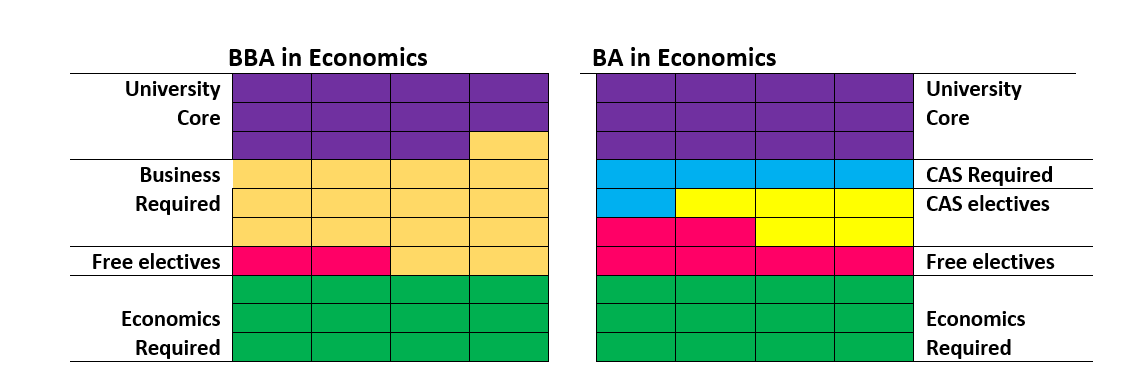
Two Economics Majors (BBA & BA) and Choosing Between Them
Economics is the social science that studies how economies work. An economy is the system a society uses to produce and distribute output. If you become an economics major, you get to study that system for four years! Fabulous!
However, which major? We have two ways to major in economics. You can graduate with a Bachelor of Business Administration (BBA) or with a Bachelor of Arts (BA). As far as economics courses, these two majors are the same. Where they differ is in the non-economics courses a student takes. Students doing the BBA take the business foundation core, while students doing the BA fulfill the College of Arts and Sciences distribution requirements. Thus, the BBA in economics prepares a student explicitly to work in a business, while the BA in economics develops a broader set of skills. A BA is also the more traditional preparation for graduate school.
That’s the big picture. Let’s look at the majors a little more closely.
Course differences
We said students in the BBA complete the business foundation core, while students in the BA fulfill the College of Arts and Science distribution requirements. What does that mean?
For an economics student, the business foundation core consists of twelve courses beyond what’s required for the major. It introduces students to leadership skills, business software, marketing, finance, accounting, law, operations management, entrepreneurship, and management. In addition, business students take a college writing class and a public speaking class.
For an economics student, the College of Arts and Sciences requirements consist of one course in effective communication, two philosophy courses, and five upper-division electives. They also require the student to develop intermediate-level competency in a foreign language. At most, that means completing four courses in the language of your choosing—but some students don’t need to take any language classes, because they studied lots of language in high school. So, in all, fulfilling the College of Arts and Sciences requirements means completing between eight and twelve courses beyond what’s required for the major.
So, you can see that the BA might be attractive to a student who would like the freedom to explore a variety of subjects in college and the BBA might be attractive to a student who is interested in the specific knowledge and skills that make a business run.

Back to the big picture
The BBA in economics links a broad grasp of business knowledge and skills with a deep understanding the economic environment of business. In addition, students develop analytical skills, including data analysis skills, which can help businesses plan. Skills students develop in this area can prepare them for a wide variety of management positions.
The BA in economics develops critical thinking and communication skills that come with a liberal arts degree, rather than specific skills and knowledge useful to businesses. By combining liberal arts critical thinking skills with analytical skills, a BA prepares students for a broad range of private and public sector careers, as well as for graduate study.
BBA Major Requirements for the School of Business
BA Major Requirements for the College of Arts and Sciences

Nolan Pool
- Class of 2017
Economics
"I chose economics because you get to put on a bunch of different lenses and just see how businesses and people work together and the effects it has."